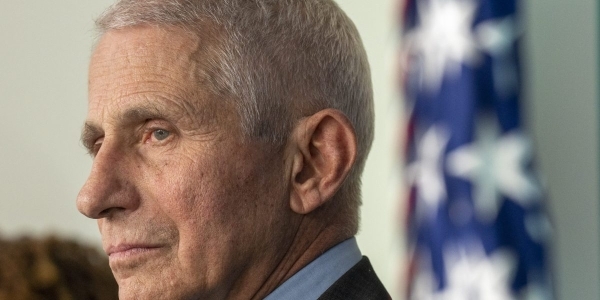
Anthony Fauci is about to leave a post he’s held for decades. But the criticism he’s faced for his COVID-19 response is far from over—something he’s well aware of, he indicated Sunday.
Fauci will step down next month as director of the National Institute of Allergy and Infectious Diseases, having advised every president since Ronald Reagan as the White House’s chief medical adviser.
His departure from the job won’t mean a departure from the public eye, however, as House Republicans, who have accused him of lying and abusing his power during the pandemic, have vowed to examine his actions and ask him to testify under oath.
Kevin McCarthy, expected to be House speaker next year, tweeted in August:
“Dr. Fauci lost the trust of the American people when his guidance unnecessarily kept schools closed and businesses shut while obscuring questions about his knowledge on the origins of COVID. He owes the American people answers. A @HouseGOP majority will hold him accountable.”
The GOP, despite a “red wave” not materializing in the midterms, did win enough seats to seize control of the House. That will give Republican lawmakers the power to launch investigations focused on Fauci.
Speaking Sunday on CBS’s Face the Nation, Fauci said he would “absolutely” cooperate with an investigation into his handling of the pandemic and testify before Congress if asked.
“Oh, of course. I mean, I’m very much in favor of—of legitimate oversight. Absolutely. I mean, I’ve testified before Congress, given the 38 years that I’ve been director, literally hundreds of times, in many oversight hearings,” Fauci said.
While Fauci has most recently dealt with COVID and monkeypox, he’s also faced the HIV/AIDS epidemic, the West Nile virus, Ebola, and other threats over the decades.
Anti-Fauci campaigns
He said Sunday that Republicans have “clearly politicized” public health, adding, “It is very clear when people are running their campaigns with an anti-Fauci element to it. That’s ridiculous. I mean, this is a public health issue. So yeah, it’s going to keep going likely much more geared toward me.”
But, he said, “I didn’t get involved before in the politics and I’m not going to get involved now in the politics. I’d be more than happy to explain publicly or otherwise, everything that we’ve done.”
He also spoke on NBC’s Meet the Press Sunday, saying he’s “very troubled” by the division in American politics.
“As a public health official, I don’t want to see anyone suffer and die from COVID. I don’t care if you’re a far-right Republican or a far-left Democrat, everybody deserves to have the safety of good public health, and that’s not happening.”
He noted that between 300 and 400 people are still dying daily from COVID, and that the uptake of the latest vaccine booster has been less than 15%. “I think the idea that, ‘Forget it, this is over’—it isn’t,” he said, warning that America is still “certainly” in the pandemic.
On Tuesday Fauci delivered what will likely be his final COVID briefing as White House chief medical adviser.
“My message…maybe the final message I get from this podium, is that please, for your own safety, for that of your family, get your updated COVID-19 shot as soon as you’re eligible to protect yourself, your family, and your community,” he said.
On Meet the Press, he described how he’d like to be remembered.
“I hope to be remembered for what I’ve tried to do, just bring science and medicine and public health principles to very serious crises we’ve had,” he said. “As I’ve said before, I’ve given it everything I have to do that.”
His critics hope he’ll be remembered in other ways, and sparks will likely fly in congressional hearings next year.





